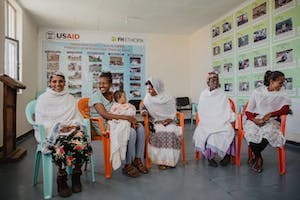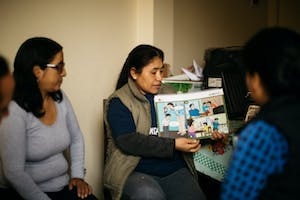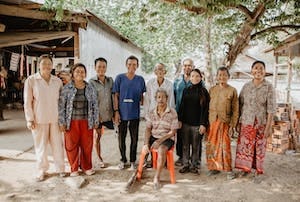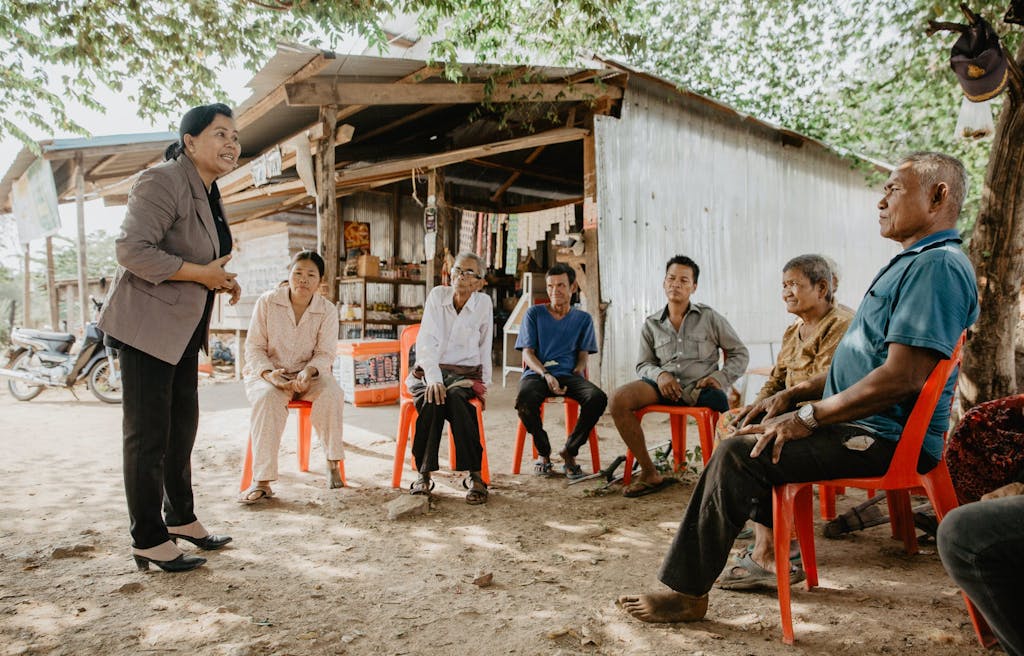It’s 7 p.m. when an evening newscaster announces that a storm is brewing. It’s a big one. The weather updates say that it’s due to make landfall within 48 hours. When it does, the impact is devastating. While houses are destroyed and cities sit underwater, people flee their schools, homes, and livelihoods, uprooting their entire lives.
Then what?
Onlookers might wonder how they can help. In the face of loss and suffering, what can be done?
At organizations like Food for the Hungry (FH), our staff near affected areas and on our Relief and Humanitarian Affairs team jump into action. FH is committed to helping the most vulnerable people in some of the most hard-hit places. It is part of our organization’s values that whenever possible, we respond where needed most.
And so we do. Generous donors make it possible for us to respond quickly and efficiently to crises as they appear. However, it is important that as much as possible, we stay engaged, supporting community resilience in their long-term recovery.
If it’s a community where FH is invested for the long-term, we want to consider the emergencies that affect people in that place. Maybe the hazard they face is long-term drought, regular flooding, or annual hurricane season. One of our goals is to help communities manage the impacts of a disaster. We want to see community resilience and leaders equipped to face hazards. So that disasters do not catch people without a plan for survival and recovery.
Today, we want to share with you some of the ways that FH helps communities prepare for disasters and give you an inside look at what recovery can look like. Because FH helps communities respond to disasters and plan for the long-term… So you can know that when you give to disaster response, you give not just immediate relief. You give help for long-term recovery.
Here are three ways FH helps prepare to manage the risks of a disaster.
1. Safety nets

If you drop your iPhone on the ground and the screen shatters, what do you do? Hopefully, you can turn to one of two options. Either your phone is under warranty or you have funds saved in the bank. Either way, you know that you will be able to replace your phone without it causing financial hardship. Sadly, many people in the United States and in communities around the world do not have either of those options. And if calamity strikes, it is often in a much bigger way than a broken phone screen.
Forming savings groups can help manage this problem.
FH facilitates the start and maintenance of “savings and loan groups” that help community members build financial literacy and access important financial resources. In communities where people do not have access to banks or lines of credit, saving enough money for big investments like a nice home, a bicycle, or even a cow or goat can be a big swing. In that situation, local savings groups provide much-needed support. Each member contributes a small portion of their income each week and then the group members take turns accessing funds. This not only provides financial resources to families, but it helps build resilience by providing households with access to financial capital, which can help them overcome specific crises.
2. Strong social ties

Have you ever cooked a recipe on a friend’s recommendation? Or asked a colleague for help fixing a problem at work? We turn to our social networks for help in all kinds of situations because we know that they have additional information and wisdom. Their advice is valuable because we trust our friends and family. And we often look to these people for help in times of need. We call them to watch our kids when we have an appointment and they bring us soup when we’re recovering from an illness.
These social ties are so important because building strong relationships help people manage shocks and stresses. Whether it’s a church member praying for you or a neighbor watching your house when you go on vacation, our friendships enable us to navigate seasons of challenge or uncertainty. That is why building strong social cohesion is contributes to community resilience.
One way FH does that is through our Cascade Groups, which equip volunteers with all of the knowledge and skills they need to talk with their friends, family, and neighbors. They learn about important topics like nutrition, infant care, and health and hygiene, and gain the ability to share those important messages with others. Not only is this an effective way to communicate vital information, but we find that it actually creates strong relationships. Think of moms sharing parenting tips with other moms! Cascade Groups helps families get to know each other and trust each other, leaning on one another and becoming better equipped to face crises together. During COVID-19 times, they help people share important information to face the pandemic and avoid illness. Stronger social ties strengthen community resilience!
3. Specific solutions

When you go on a tropical beach vacation, you pack a swimsuit. If you go on a ski trip, you bring your parka and snow pants. Both are useful to have in the right place at the right time. But if you planned to ski down a mountain in a swimsuit, you would be painfully unprepared. That is what we call “contextualization” — understanding that tools, plans, and strategies have to be right for the place. That’s also how FH approaches our disaster response and resilience building.
FH’s approach will look different if we are working with farmers who live in an arid part of Africa. Or if we are with entrepreneurs living in urban parts of the Philippines. While families in Ethiopia might face drought, pests, and lack of access to water that threatens their ability to farm, families in the Philippines might struggle with persistent flooding and typhoons that wipe out their small businesses. Both are climate-related challenges and opportunities for FH to help families plan ahead and build their capacity to respond. But the way that communities and FH staff work together might require different solutions.
Likewise, after a disaster hits, FH works closely with local authorities and community residents to assess the needs and identify assets specific to that context. Our disaster response is never “one size fits all” but always takes into account the biggest threats to people’s immediate and long-term wellbeing that are specific to that time and place.
Some of the best ways FH does that is by building community leadership. Strengthening local leadership and connecting them to their governments and nearby organizations can help prepare communities to respond to disaster alerts, assess risk, and plan for long-term resilience.
Community Resilience Means Sustainable, Not Self-Sufficient
We don’t want to see communities be “self-sufficient.” Communities that are isolated, independent, and disconnected from bigger networks will not be resilient. Instead, we seek true sustainability. Sustainability means that we want to see communities in long-term, beneficial relationships with the broader government, organizations, and businesses in their region and country. Through those networks, communities are better equipped to access resources, accomplish goals, and plan their response to disasters.
When FH can help communities identify where they are most vulnerable and plan how they can protect themselves, we know they will be more resilient than before.
See what that looks like by watching the video below.
Join us in helping communities recover from disaster and rebuild lives by giving to our emergency relief fund today.
Learn more about FH’s approach to disaster response and building community resilience:
Disaster Recovery: Making Life Better than Before


